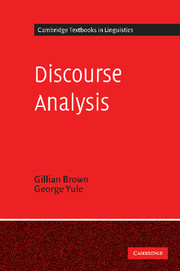
-
Select format
-
- Publisher:
- Cambridge University Press
- Publication date:
- 05 June 2012
- 28 July 1983
- ISBN:
- 9780511805226
- 9780521284752
- Dimensions:
- Weight & Pages:
- Dimensions:
- (228 x 152 mm)
- Weight & Pages:
- 0.48kg, 302 Pages
You may already have access via personal or institutional login
Book description
Discourse analysis is a term that has come to have different interpretations for scholars working in different disciplines. For a sociolinguist, it is concerned mainly with the structure of social interaction manifested in conversation; for a psycholinguist, it is primarily concerned with the nature of comprehension of short written texts; for the computational linguist, it is concerned with producing operational models of text-understanding within highly limited contexts. In this textbook, first published in 1983, the authors provide an extensive overview of the many and diverse approaches to the study of discourse, but base their own approach centrally on the discipline which, to varying degrees, is common to them all - linguistics. Using a methodology which has much in common with descriptive linguistics, they offer a lucid and wide-ranging account of how forms of language are used in communication. Their principal concern is to examine how any language produced by man, whether spoken or written, is used to communicate for a purpose in a context.
Reviews
‘This book makes for absorbing reading. It is very well-written, inspiring and clear. It is indispensable literature for anyone working in the field of discourse analysis.’
Source: Journal of Semantics
Contents
Metrics
Altmetric attention score
Full text views
Full text views help Loading metrics...
Loading metrics...
* Views captured on Cambridge Core between #date#. This data will be updated every 24 hours.
Usage data cannot currently be displayed.
Accessibility standard: Unknown
Why this information is here
This section outlines the accessibility features of this content - including support for screen readers, full keyboard navigation and high-contrast display options. This may not be relevant for you.
Accessibility Information
Accessibility compliance for the PDF of this book is currently unknown and may be updated in the future.


